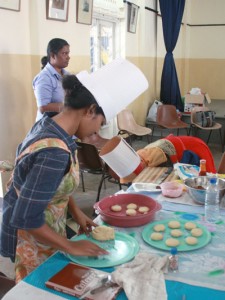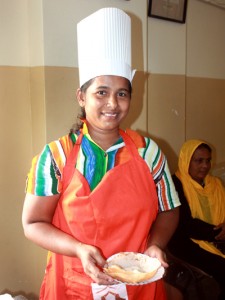‘Life Long Learning’ gives a sense of purpose
It’s evident that this isn’t Anoma D. Pathirana’s first glossy caramel pudding. Expertly flipping the tin over is something she has done in many of her cookery classes and through her student years at the Nugegoda Hotel School. The slowly spreading smiles on the women surrounding her

Learning new skills: Some of the participants. Pix by Athula Dewapriya
watching with hawk-like attention as the pudding emerges, hinted that this didn’t happen too often for them.
Otherwise peaceful, the Girl Guide headquarters was buzzing with sounds of sizzling, chopping and the occasional clatter of cooking utensils last Friday. It was a momentous day for those involved in the Life Long Learning (3L) project as the latest set of beneficiaries demonstrated their prowess. Currently in the third year of operation, the project’s objective is to reach out to house-bound women.
For six-eight months, a group of 30 women are trained in various fields underthis project. Chosen from those who are unoccupied due to the lack of skills and cannot afford to acquire them, the 3L project, if anything, opens up a world of prospects. “Ordinarily they would have nothing to do at home,” says Priyanthi Rajapaksa of the Sri Lanka Girl Guides (SLGG). Once the morning chores are complete the women of the lower income brackets often only tend to children after they return from school. “What we do is provide them with a skill they enjoy to generate some money in their free time.”
The project started out with a group of women in Mattakuliya two years ago. Working together with state authorities, the women were invited to a familiar location accessible to all participants within the locality -a temple or even a community centre, where various workshops were carried out. Said Nirmali Wijekoon of SLGG, “This is how we are different- we go to them, without expecting them to come to us.”

Home-made hoppers: N. M. Nirosha
Providing everything from tutors, utensils, materials and even in the case of IT workshops- which is a popular option among the younger women- transport, finding funding is nothing short of steep. Convincing the Asia Pacific Region under the World Association of Girl Guides to fund the first project by submitting an application Nirmali says “they have been on board with the funding ever since.” After the successful work done in Mattakuliya, the second batch of women who benefitted from the funding were from Nugegoda. At the end of each nine-month period, the participants are given a certificate and where outside expertise is sought as in the field of IT, certification is given from those recognised bodies as well, she explains.
The project is designed to give the women income but more importantly, a sense of purpose. Daily workshops in varied fields from crafts to catering allowed them to “expect something new every day.” Success stories of women now running a business aside, Rasanga Piyanwila of the Urban Settlement Development Authority, has seen the effect it has had on the community. His responsibilities include finding suitable women to apply for the programme. On visiting their homes after the workshop, the improved standard of living and colourful hand-made crafts aren’t the only noteworthy changes he says. “Communities that didn’t care too much for learning something different are now requesting more programmes of this sort.”
Apart from providing a welcome change from “a fairly mundane existence” Deputy Commissioner SLGG Visakha Tillakaratne feels it’s a first for the Guides as well. It’s the first time a project has been designed focusing on the macro perspective in terms of empowerment.
Scanning through about 80 applications and choosing 30 for the workshops is a difficult process. “Sometimes the most deserving cases have dependents, like children” Nirmali shares, and the sessions have to be flexible. The presence of children prancing through their workspace is however not a hindrance to the determined women. N. M. Nirosha is one participant in the latest batch of women who has made it work with three kids. Offering us a plate of hoppers, fresh from the pan, the 36-year-old says she learned to make them in September last year. The very next day she started making an income from her new skill. After supplying shops in the vicinity, Nirosha “started making hoppers at around three in the evening” in her living room. Customers have kept swarming in and she feels “happy that I can make an extra income for my children.”


